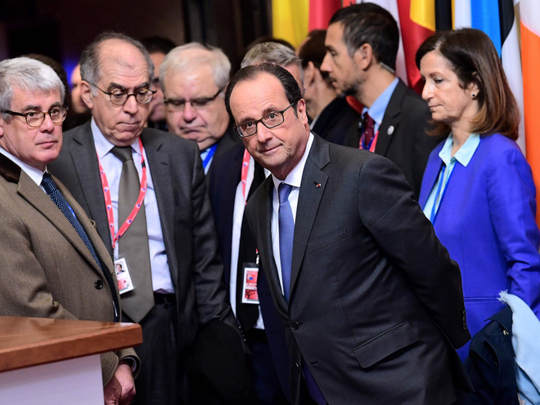
Brussels: Canada walked out of talks meant to save a trade deal with the European Union (EU) on Friday, unable to break a deadlock with a small Belgian region that was holding off next week’s official signature.
The departure of Canada’s international trade minister was a stunning setback and leaves unclear whether the rest of the EU will be able to persuade the region of Wallonia to sign up to the agreement.
Canadian International Trade Minister Chrystia Freeland said it had been impossible to overcome the differences with Wallonia, a region of barely 3.5 million people. The agreement needed unanimity within the EU, and Belgium, in turn, needs unanimity among its regions.
“It seems that for me, and for Canada, that the EU is not capable now to have an international deal, even with a nation with such European values like Canada,” Freeland said as she left.
Near tears, she said that “Canada is disappointed ... but I think it is impossible.”
The deal was supposed to be signed next week in Brussels by Prime Minister Justin Trudeau.
The disagreement has pitted Wallonia, a region of 3.5 million people that’s smaller than New Jersey, against the entire EU and Canada, with populations of over 500 million and 35 million.
An official at the European Commission, which has been chaperoning the pact through negotiations, said it “doesn’t consider that this is the end of the process.” The official declined to be named because the talks are at a sensitive phase.
It was unclear how the EU would keep negotiating with Wallonia in coming days to solve the impasse.
Wallonia wants more guarantees to protect its farmers and Europe’s high labour, environmental and consumer standards. It also fears the agreement will allow huge multinationals — first from Canada, later from the United States, if a similar deal with Washington follows — to crush small Walloon enterprises and their way of life.
Proponents say the deal would yield billions in added trade through tariff cuts and other measures to lower barriers to commerce. At the same time, the EU says it will keep in place the region’s strong safeguards on social, environmental and labour issues.
Paul Magnette, the president of Wallonia, spent hours talking with EU officials and Freeland to find a compromise by the end of a two-day summit in Brussels.
Earlier on Friday, Magnette had already pleaded “that, in an amicable way, we jointly postpone the EU-Canada summit and that we give ourselves time.”
EU leaders warned that failure to clinch the deal with Canada could ruin the 28-nation bloc’s credibility as a trade partner and make it more difficult to strike such agreements with other global allies like the United States and Japan.
As the leaders wrapped up a summit in Brussels on Friday afternoon, negotiations fell apart between officials from the EU Commission, regional leaders and Freeland in Wallonia’s capital, Namur, 65 kilometres away.
German Chancellor Angela Merkel, whose country is the EU’s single biggest economy, said at the time that she was optimistic a deal would emerge from the talks.
Manfred Weber, leader of the EPP Christian Democrats, the biggest group in the European parliament, was less enthusiastic about local politics holding up such a significant international agreement.
“Europe cannot be held hostage because of internal political games in the Walloon regional,” he said.
A similar free trade agreement between the EU and the United States is also being negotiated, but has met with far more opposition than the Canada pact. Progress on the US deal is highly unlikely any time before next month’s American election.
EU Commission President Jean-Claude Juncker said after the EU summit that he hoped a deal would be reached “within the next few days.”
Belgian Prime Minister Charles Michel said he had worked through the night in an effort to broker a deal.
Juncker said the deal would be worth the effort. “It is the best one we ever concluded and if we will be unable to conclude a trade arrangement with Canada, I don’t see how it would be possible to have trade agreements with other parts of this world,” he said.
Magnette said the question is not about rejecting globalisation, but about what kind of rules should govern it: “How will this globalisation be done? With strong rules or weak rules? Will it protect public freedoms or will multinationals rule the law?”












